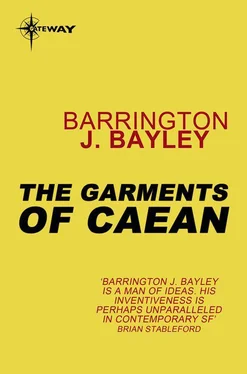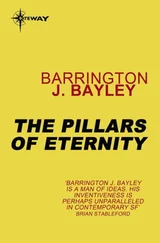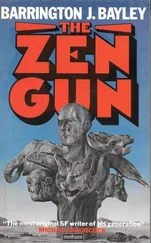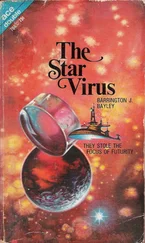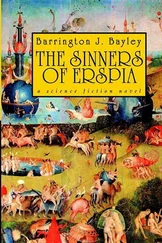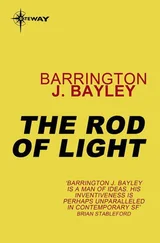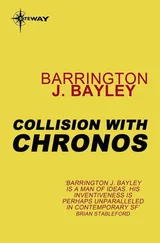Slowly, aware that they were voting for war with Caean, they all raised their hands in the air.
The last people were coming back into the ship, trudging over the soot beds. It was time to be lifting off; Caeanic harvesters no doubt arrived here with regularity.
Amara’s team had taken cuttings of the Prossim plant to be conveyed, under sterilized biokiller seal, for study in Ziode; and they had gathered up the remaining pathetic scraps of the garment crop, also for study. Peder stood on the lip of the exit bay port, looking out over the scene for the last time. He wore plain garments given him by Estru. Though pale and shattered in spirit he had recovered his composure and was no longer mentally unbalanced. He even managed to nod in friendly fashion to Estru when he joined him at the port.
Together they shared the view. In one direction a rim of green could be discerned where the unburnt Prossim began again. The wrecked freighter was slumped in the middle of the dead area like a slaughtered mammoth, black dust piling up against it in the breeze.
Estru sighed, shaking his head, then chuckled cynically. ‘You know, I’m wondering if they’re going to believe any of this back in Ziode. How many other intelligences of this type do you think there are? It’s odd we haven’t come across any before.’
‘I don’t think it’s very common,’ Peder said slowly. ‘It’s too anomalous. The universe is a place of motion and conflict where passive sentience can’t easily get a hold. Perhaps it’s an evolutionary counterpart of anti-matter – equivalent to normal matter and just as probable in theory, but scarcely ever encountered in fact.’
They moved aside as the last man came aboard and the port was closed. Together they made their way up the ramp and into the belly corridor. As they were about to part, Estru paused reflectively.
‘By the way, we shall want to carry out some investigative psychoanalysis on you,’ he said. ‘You’ve been through a unique experience, you know. Don’t worry, though, it isn’t painful – well, a little stressful occasionally, perhaps. We should have finished by the time we get home.’
Peder felt the ship lifting off as he made his way alone to his cabin; which not altogether by chance happened to be the one so recently vacated by Alexei Verednyev. In a way it was decent of Estru to be so friendly. Very few on the Callan felt any sympathy for him at all, and it was by no means clear what his eventual fate would be. Still, he believed he had a fair chance of being given parole and of being allowed to live as a private citizen. Even in a Ziodean court of law one could justifiably plead alien mental interference as a mitigating circumstance, he would have thought. And if Mast was to get off, why shouldn’t he?
Perhaps he could even become a sartorial again.
He entered his tiny cabin, locked the door and sat down with a thankful sigh.
It was good to have all the pressure off.
He opened the buttoned pocket of his crumpled work jacket and took out its precious cargo.
His little memento: a tie, of a captivating magenta colour. He ran it through his fingers, feeling its gorgeous silky texture, caressing his cheek with it. Marvellous! It was like something alive!
Carefully he draped it under his collar and tied a loose knot in it, peering into the cabin mirror and admiring its effect even on the grubby shirt he was wearing. He was grateful now that they had let him out to poke among the ashes with the others, before the place had been given one final burning to eradicate all trace of the Frachonard crop. They had seemed glad to have someone to help them gather up all the bits and pieces – the fragments of cloth, even one or two whole garments. It had been easy to filch this one little item.
There was something else. He opened a handkerchief in which something soft and fleecy was carefully wrapped: a spore pod. Like the tie he had found near it, it had escaped the searing heat of the flamethrower – or almost. It was a little singed round the edges, as indeed was the tie. It was hard to say whether it would still be viable.
Peder would never really be able to forget his Frachonard suit, despite all the hard times it had put him through. His reasoning was that the spores in the burned patch of Prossim might already have been imprinted with the genetic information to grow Frachonard suits. If he let a spore germinate, it might grow him one. Just one – that was all he would allow. With the main mass destroyed by the Ziodean Navy, it wouldn’t be able to control him as the first one had.
He couldn’t see any risk. He would be the plant’s gardener. It would be cultured. He would be able to restrict its growth.
He would only allow it to grow one suit. To begin with, anyway. It would be wonderful to have such a suit that was his helpmate, not his master.
Only one suit.
If you’ve enjoyed this book and would like to read more great SF, you’ll find literally thousands of classic Science Fiction & Fantasy titles through the SF Gateway.
For the new home of Science Fiction & Fantasy…
For the most comprehensive collection of classic SF on the internet…
Visit the SF Gateway.
www.sf-gateway.com
Also by Barrington J. Bayley
Age of Adventure
Annihilation Factor
Collision with Chronos
Empire of Two Worlds
Sinners of Erspia
Star Winds
The Fall of Chronopolis
The Forest of Peldain
The Garments of Caean
The Grand Wheel
The Great Hydration
The Pillars of Eternity
The Rod of Light
The Soul of the Robot
The Star Virus
The Zen Gun
The Knights of the Limits
The Seed of Evil
Barrington J. Bayley (1937–2008) was born in Birmingham and began writing science fiction in his early teens. After serving in the RAF, he took up freelance writing on features, serials and picture strips, mostly in the juvenile field, before returning to straight SF. He was a regular contributor to the influential New Worlds magazine and an early voice in the New Wave movement.
A Gollancz eBook
Copyright © Barrington J. Bayley 1976
All rights reserved.
The right of Barrington J. Bayley to be identified as the author of this work has been asserted by him in accordance with the Copyright, Designs and Patents Act 1988.
This eBook first published in Great Britain in 2011 by Gollancz
The Orion Publishing Group Ltd
Orion House
5 Upper Saint Martin’s Lane
London, WC2H 9EA
An Hachette UK Company
A CIP catalogue record for this book is available from the British Library.
ISBN 978 0 575 10209 5
All characters and events in this publication are fictitious and any resemblance to real persons, living or dead, is purely coincidental.
No part of this publication may be reproduced, stored in a retrieval system or transmitted in any form or by any means, without the prior permission in writing of the publisher, nor to be otherwise circulated in any form of binding or cover other than that in which it is published without a similar condition, including this condition, being imposed on the subsequent purchaser.
www.orionbooks.co.uk
